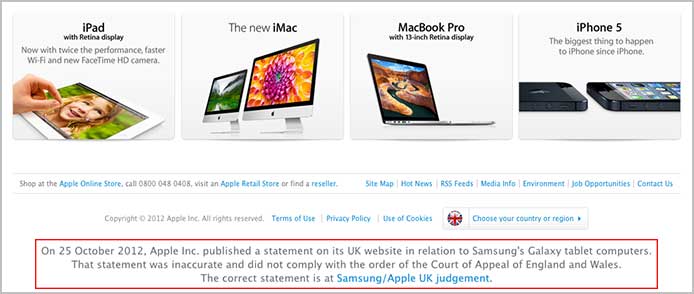Apple ordered to pay Samsung legal fees for 'misleading' UK notice
In a UK court ruling on Friday, Apple was ordered to pay Samsung's legal fees after the company was found to have not complied with a previous determination demanding a notice be posted to its website saying the South Korean company did not infringe on the iPad's design.
First reported by Groklaw, the Court of Appeal of England and Wales found the original posting on Apple's website to contain inaccuracies and "false innuendo," warranting the payment of Samsung legal fees on an "indemnity basis," which is higher the "standard" basis.
In July, UK Judge Colin Birss handed ordered Apple to post a notice on the homepage of its website saying Samsung did not copy the design of the iPad. When the post went up, however, it came in the form of a link to a statement which Apple had modified, adding in three paragraphs of non-compliant text between the ordered material's two paragraphs.
The court found the added content to be false and sought to "undermine the intent" of the order, specifically citing a quote from Judge Birss regarding the distinctive nature of Apple products, saying it was taken out of context and "foster[ed] the false notion that the case was about the iPad."
Also a point of contention was the reference to judgments over similar patent trials from around the world, including the landmark Apple v. Samsung U.S. trial in which Apple was awarded $1.2 billion in damages. The court said such insertions were "calculated to produce huge confusion" and that the notice contained "further false innuendo that the UK court's decision is at odds with decisions in other countries whereas that is simply not true."
Earlier in November, Apple was ordered to rewrite the notice as per the intended order. Friday's ruling was meant to illustrate the court's disapproval of Apple's conduct, especially in regard to its respect for the original order.
To conclude, the judgment's author, Sir Robin Jacob, offered the following scathing remark: "I hope that the lack of integrity involved in this incident is entirely atypical of Apple."
The ruling in full from England and Wales Court of Appeal (BAILII):
 Mikey Campbell
Mikey Campbell











 William Gallagher
William Gallagher

 Chip Loder
Chip Loder
 Andrew Orr
Andrew Orr
 Marko Zivkovic
Marko Zivkovic
 David Schloss
David Schloss

 Malcolm Owen
Malcolm Owen






